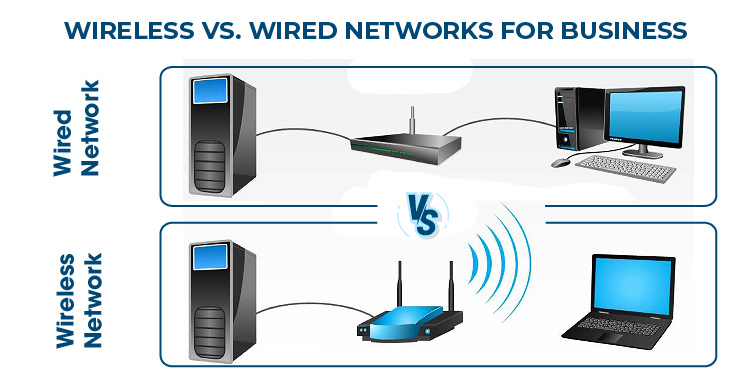High-speed connectivity remains one of the key needs of businesses around the globe. The efficient method of connecting your business with the internet and other cloud services is through LAN (local area network). The LANs provide connectivity to your systems –PCs, laptops, and mobile devices—in small areas, such as buildings. LANs are either wired or wireless. Wireless LANs use wireless technologies whereas wired LANs use high quality ethernet cable.
Let’s see how wired networks fare against wireless networks and which one of these two is best for your business’s needs.
Security
When it comes to data security, the wired network provides much better security than wireless networks.
All you need to do is to configure your wired network with some security applications and necessary firewalls. Your IT team also needs to ensure that when using a wired network, they have activated correct ports and are continuously monitoring the network for suspicious activity.
When compared with wired networks, wireless networks are less secured. Even if you have placed encryption technologies like WEP or WPAE for enhanced security, the security of your wireless connection can still be compromised. This is mainly because connectivity occurs through radio waves.
So, when it comes to security, we can safely say that wired connections are much safer than wireless connections. Therefore, it is a better choice to buy ethernet cables to set wired connections for your business.
Speed
With the arrival of high-quality ethernet cable and Gigabit routers, wired networks remain far ahead of wireless networks in terms of data transfer speed. As in the wired network, you use a separate cable to connect systems with devices, the data transmission speed remains far higher than that of a wireless connection.
Your ethernet cables bulk usually don’t have any dead spots. As you can virtually control traffic on your wired network, the data transmission rate remains faster as you keep unauthorized users at bay.
As far as speed in wireless networks is concerned, they are less efficient. The dhttps://samzec.com/whats-the-difference-between-cat6a-riser-and-cat6a-plenum-cable.htmlata transmission speed of your network also depends on signal strength; the weaker the signal strength, the slower the internet speed. Besides facing EMI interferences, the wireless connection also faces physical hindrances lie walls, furniture, and ceilings.
Again, we can safely say that wired connections are much faster than wireless connections.
Reliability & Stability
If Wired network, configured properly and in a professional manner, provides a higher level of stability and reliability. Once all the devices—ethernet cables, switches, and hubs—are installed, the end product is a durable and dependable workhorse system.
When it comes to wireless connections, their signals are often influenced by other connections, such as the presence of multiple Wi-Fi devices in close proximity. As in the wireless connections, signals of one network are prone to interference by signals of another network, the stability is compromised.
The stability factor of wireless connection also heavily relies on your location in relation to the device; the further you are from the device, the lower is the signal strength and hence reliability.
Again, wired connectivity has won the comparison.
Installation
As the whole process of setting up a wireless connection demands less equipment, it is easier and faster to install. The installation of a wireless network is time-saving, too. You do not need to separately connect each device using cables.
When it comes to setting up or installing a wired network, it requires much more time and equipment. The installation process consumes more time because you have to separately connect each device through ethernet cables bulk, configure firewalls and security applications, and install switches and routers.
So, when it comes to installation, a wireless network has an edge over a wired network.
Maintenance Cost
The maintenance cost of the wired network depends on the size of your network. If it is bigger, it means you require a server or servers and other connectivity devices along with skilled professionals. All this adds up to the cost.
The cost for installing and maintaining and a wireless connection is rather inexpensive. However, if you use a commercial-grade router for increasing reliability and improving security protocols, it will increase. Adding a wireless repeater (an instrument that increases signal strength) to your network will further hike the cost.
Mobility
When it comes to mobility, wired networks are inflexible. If you want to use a device in any other location, you have to arrange extra cable and switches.
A wireless network gives you more flexibility with mobility. You can access your network from any location as long as the signal strength is good. Also, you don’t have to worry about the cables while changing your location. Plus, the wireless connection needs less physical space as compared to wired networks.
Wired Network vs Wireless Network: which one is better for your business?
We strongly recommend you use wired networks for your business If data security and data transfer speed are your primary concern.




















